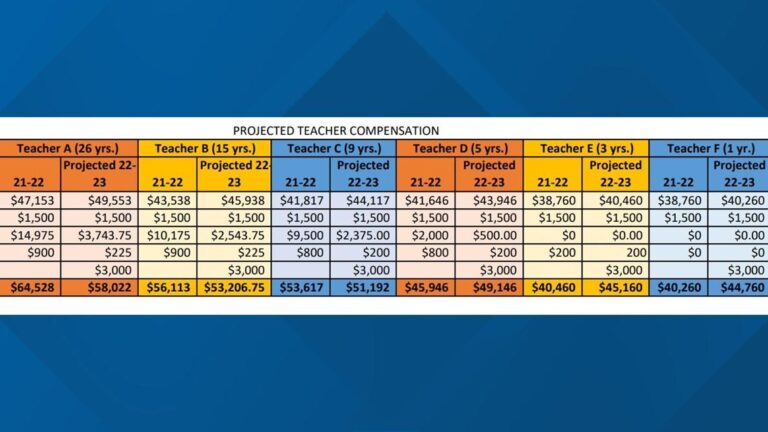An Arizona teacher recently sparked a wave of discussion after sharing their salary details on social media, questioning the value of a college degree in relation to teacher pay. The post, featured on azcentral.com and The Arizona Republic, highlights ongoing concerns about educator compensation in the state, reigniting debates over wages, educational qualifications, and the challenges faced by teachers in ArizonaŌĆÖs public school system.
Arizona Teacher Shares Salary on Social Media Igniting Debate Over Educator Pay
In a recent social media post, an Arizona educator publicly revealed her annual salary, sparking widespread discussion about the adequacy of teacher compensation in the state. The disclosed figures highlighted a grim reality: despite having a college degree and years of experience, her pay barely matches the living costs, leading many to question the value placed on education professionals. The post quickly went viral, drawing attention from fellow teachers, parents, and policymakers alike, all weighing in on the state’s investment in its educators.
Key points raised by the post include:
- The disparity between teacher salaries and required educational qualifications.
- The challenges teachers face balancing quality education with financial constraints.
- Calls for increased funding and policy reforms to uplift teacher pay scales statewide.
| Teacher Experience | Arizona Average Salary | National Average Salary |
|---|---|---|
| Entry-Level | $41,000 | $43,000 |
| Mid-Career | $50,500 | $60,000 |
| Experienced | $58,000 | $70,000 |
Comparing Teacher Salaries to Other College Degree Careers Reveals Significant Gaps
Arizona educators have spotlighted a glaring disparity between their wages and those of other professionals holding college degrees. Despite the critical role teachers play in shaping future generations, their compensation often falls short when compared to peers in fields requiring similar educational investments. For instance, professions like engineering, nursing, and information technology not only command higher starting salaries but also offer more robust growth potential, leaving many teachers questioning the financial viability of their chosen career path.
The gap is underscored by state wage data, which reveals some striking differences:
- Average starting salary for Arizona teachers: $40,000
- Average starting salary for engineers: $65,000
- Average starting salary for registered nurses: $55,000
- Average starting salary for IT professionals: $60,000
| Career | Average Starting Salary | Degree Required |
|---|---|---|
| Teacher | $40,000 | Education Degree |
| Engineer | $65,000 | Engineering Degree |
| Nurse | $55,000 | Nursing Degree |
| IT Professional | $60,000 | Computer Science Degree |
These figures lay bare the financial challenges teachers face, especially given the demands of their profession. Many educators express frustration that the dedication and expertise they bring to classrooms are undervalued in financial terms, sparking debate on the need for more competitive salaries to attract and retain quality talent.
The Impact of Teacher Compensation on Recruitment and Retention in Arizona Schools
Teacher compensation in Arizona has become a focal point in conversations about educational quality and workforce stability. With salaries often lagging behind the cost of living, many educators express frustration over stagnant wages that do not reflect their years of training, responsibilities, or the critical role they play in shaping future generations. Social media posts highlighting actual teacher paychecks have sparked statewide debates, revealing that the starting salaries for many teachers barely surpass minimum wage levels, even for those holding advanced degrees. This disparity directly impacts recruitment efforts, as potential educators are deterred by financial insecurity, leading to a shrinking applicant pool and increased difficulty in filling vacancies.
The ripple effects extend to retention rates, with many experienced teachers leaving the profession or relocating to states offering more competitive pay. School districts face growing challenges, often resorting to emergency certifications and substitute teachers to plug staffing gaps. Key factors influencing these trends include:
- Inadequate salary progression ŌĆō Slow or nonexistent raises that fail to reward experience
- High living costs ŌĆō Salaries that do not align with rising housing and living expenses
- Lack of benefits ŌĆō Limited retirement and healthcare support compared to other professions
| Experience Level | Average Annual Salary | Statewide Vacancy Rate |
|---|---|---|
| Entry-Level | $40,000 | 12% |
| Mid-Career | $52,000 | 8% |
| Veteran | $65,000 | 5% |
Policy Recommendations for Addressing Wage Disparities in Arizona Education Sector
Addressing wage disparities within ArizonaŌĆÖs education sector requires immediate and targeted interventions. Policymakers must consider implementing transparent salary frameworks that align pay scales with educational attainment, years of experience, and regional cost of living. Additionally, increasing state funding dedicated specifically to educator compensation can help bridge the gap between current salaries and the financial demands teachers face. This not only fosters retention but also attracts a highly qualified workforce to public education.
Key strategies that Arizona legislators and school districts should prioritize include:
- Regular salary reviews with annual adjustments tied to inflation and market benchmarks.
- Incentive programs for advanced certifications and teaching in underserved communities.
- Investment in professional development to enhance teacher skills while rewarding career growth.
- Improved benefits packages to complement wage increases and improve overall job satisfaction.
| Policy Initiative | Expected Impact |
|---|---|
| Salary Transparency | Promotes equitable pay and trust |
| Market-Adjusted Raises | Helps retain skilled educators |
| Incentives for Underserved Areas | Addresses regional pay imbalances |
| Enhanced Benefits | Increases overall job satisfaction |
To Wrap It Up
As the conversation around teacher pay gains renewed attention, this Arizona educatorŌĆÖs social media post highlights the ongoing challenges faced by educators nationwide. With many questioning the value placed on teaching professions, the debate over adequate compensation and the requirements for earning a sustainable salary remains critical. Policymakers and communities alike continue to grapple with finding solutions to ensure that teachers receive equitable pay reflective of their qualifications and contributions.









